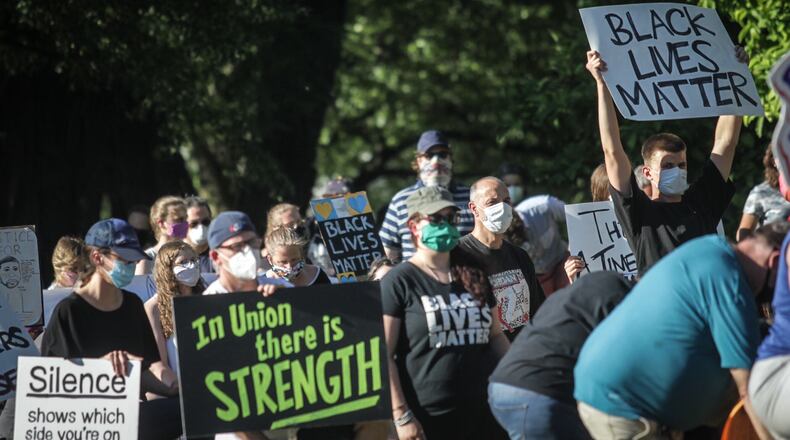>> PHOTOS: Protesters gather in Oakwood for social justice
Orville Wright’s Hawthorn Hill mansion on Harman Avenue was named after the street on Dayton’s west side where he and his brother Wilbur lived before becoming aviation pioneers, said Mike Miller, executive director of the Dakota Center, located a few blocks from the historical Hawthorn Street site.
“Come down to West Third Street and shop,” said Miller, an Oakwood school board member. “Come down and hang out. Come down and visit the original Wright brothers house.
EARLIER: Black Lives Matter rally set for Oakwood
“Four miles from here you enter a different world – a world that makes us uncomfortable, a world that keeps us a part, a world that is wrapped in our own perceived fears,” he added.
Miller told the crowd now is a “time for us to come together, look for ways to get engaged. Share your time. Share your dollar. But most importantly, take the courage to start and share a relationship.”
The rally was among several Dayton-area protests and events in the wake of the death of George Floyd, a Minneapolis, Minn. man who died in police custody May 25 after a police officer knelt on his neck for several minutes.
The rally was organized by Oakwood residents seeking to enlighten the city’s predominantly white population and was held several months after a report raised questions about racial bias of the part of Oakwood police officers.
‘White woman privilege’
Miller was among more than 10 who spoke at the rally attended by residents across the Dayton area. He was the only Oakwood elected official of those invited to speak to do so, organizers said.
PROTESTS: Dayton protests: Worried by violence; hopeful for change
Rallygoer Sean Mitchell of Dayton said he was there after years of seeing “folks that our systematic racism is victimizing. And in that time, it’s been very apparent that there’s no chances to get ahead.”
Being “very aware of my white woman privilege” was what prompted Alexandra Shannon of Vandalia to go.
“When I get pulled over for a ticket I never get in trouble. And I get let off for things that I know a black man would definitely get a ticket for or get criticized for,” Shannon said.
Oakwood was founded as a result of a “redlining” process where “blacks and whites could not live together,” Amaha Sellassie, president of the Gem City Market Board, told the crowd.
Redlining created a scenario where “Oakwood could still get resources and benefits and (residents) could still walk downtown. That was the key,” Sellassie said.
POPULAR: Historic downtown landmarks, businesses damaged in protest unrest
“When the barriers were made, you could still enjoy what was happening downtown. But pool the resources into Oakwood,” he added.
“Now is that moment to build a shared future from a divided past…to heal the historical wounds,” Sellassie said.
“Have the conversations with your friends,” he added. “Support black businesses, people of color businesses. Open doors.”
‘Open up your wallets’
The Oakwood “dome” insulates the city and the community encourages racism in various ways, Oakwood High School graduate Amelia Kvalheim told the crowd.
“I would encourage you to open up your wallets, support the black and brown businesses,” she said.
“Black and brown people deserve economic change…,” she said. “It’s about time the cops stopped disproportionately pulling over black and brown drivers” while other start “investing in black communities.”
EARLIER: Oakwood looks to ban scooters that Dayton, Kettering and other cities have limited
A report last year indicated the city’s safety department stops and tickets black drivers at a much higher percentage than they represent in Oakwood.
Advocates for Basic Legal Equality (ABLE), a nonprofit law firm that represents low-income individuals and groups in western Ohio, and a University of Dayton criminal justice professor released the report in late 2019.
The report said traffic-ticket data in Oakwood shows that black drivers in that city accounted for nearly 22 percent of the stops where a problem with driving or equipment was observed. However, they accounted for nearly 37 percent of stops where a license plate check was run without tickets being written for an observable driving or equipment problem.
Oakwood’s black population is less than 1 percent and its total non-white population is less than 7 percent, according to U.S. Census Bureau data.
Condemning police actions
When contacted earlier this week about what action the city has taken to address the ABLE report’s findings, City Manager Norbert Klopsch referred to Oakwood’s website.
EARLIER: Centerville board rules on fired sergeant’s suspension
Oakwood safety personnel “complete an extensive training program. The training program involves numerous topics, and regularly includes courses on cultural diversity and implicit bias,” according to the city website.
A letter from Oakwood Safety Director Alan Hill posted on the city’s website Thursday strongly condemned the actions by police officers before Floyd died.
“What happened to Mr. Floyd in Minneapolis that day goes against all that is taught about professional policing. It violates every tenet of policing, every principle of law enforcement, and every mission, vision and value statement associated with police work,” the letter stated in part.
“We all need to work together to swiftly address what happened in Minneapolis in the most comprehensive way possible, and on a national scale,” according to Hill’s letter.
“We need to develop very specific, concrete and measurable ways to implement personnel, operational and policy changes that will do everything possible to prevent reoccurrence of that horribly ugly day. We need to protect the lives of all the people we serve, and need to find ways to keep bad officers out of our police ranks everywhere.”
RELATED: Dayton area church leaders: Protestors’ voices not being heard
RELATED: Oakwood preparing response to report alleging racial profiling
About the Author

